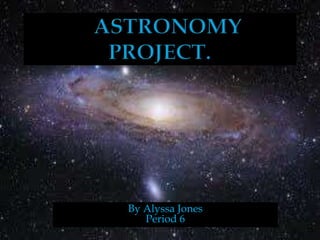
Astronomy by alyssa
- 1. By Alyssa Jones Period 6
- 2. The universe is the home to all the galaxies, stars, planets, matter, energy, and other objects. The universe is usually defined as the totality of existence. Observations show that the universe is expanding at a accelerating rate.
- 3. Spiral galaxies are made out of dust and bright stars. Elliptical galaxies are round. Some are small, and some are big. Irregular galaxies have many different shapes. The milky way galaxy contains around one trillion stars. It belongs to a group which contains about thirty galaxies.
- 4. Asteroids are small bodies that never grew large enough to be a planet. Meteoroids are a piece of debris in the solar system. When it reaches the Earth’s atmosphere it becomes a meteor. Meteorites is when a meteoroid survives the impact after reaching the ground.
- 5. Mercury and Venus both have no moons. Mercury is the closest planet to the sun. There are many craters on Mercury. Venus is known as Earth’s twin. Venus has very high pressure and temperature.
- 6. Mars has two moons, named Phobos, and Deimos. Mars is called the red planet because iron oxide gives the weathered rocks a reddish color. Earth has one moon, named Luna. Earth formed about 4.54 billion years ago. It takes Earth 365 Earth days to orbit the sun. On Earth water can be a solid, liquid, or a gas.
- 7. Jupiter has sixty-three moons, the main ones are Io, Europa, Ganymede, and Callisto. Jupiter is the largest planet. It also has active volcanoes on its surface. Saturn has a total of sixty-one moons, the main two are Titan, and Rhea. Saturn has a very complex ring system. The second largest planet is Saturn.
- 8. Uranus has twenty-seven moons, two are Cordelia, and Ophelia. Uranus has thin dark rings. It’s axis of rotation is tilted. Neptune has thirteen moons, one is named Triton. Neptune's rings vary in sizes, and thickness. Sometimes its farther from the sun then, the dwarf planet, Pluto.
- 9. The solar system only has eight planets, but also has four dwarf planets. The solar system goes out as far as about 2 light years. Everything in the solar system orbits in the same direction. The solar system is 4.6 billion years old. Most of the solar system is the sun. A light year is the distance light travels in a year.
- 10. Astronomers used to think that the Earth was the center of the universe. The sun is just one out of 200 billion stars in the milky way galaxy, but all the stars are really far apart and well spread out. Jupiter acts as sort of a vacuum cleaner, and pulls in things such as meteors, and comets. A season on Uranus lasts 22 years. When the moon is directly overhead you way slightly less.